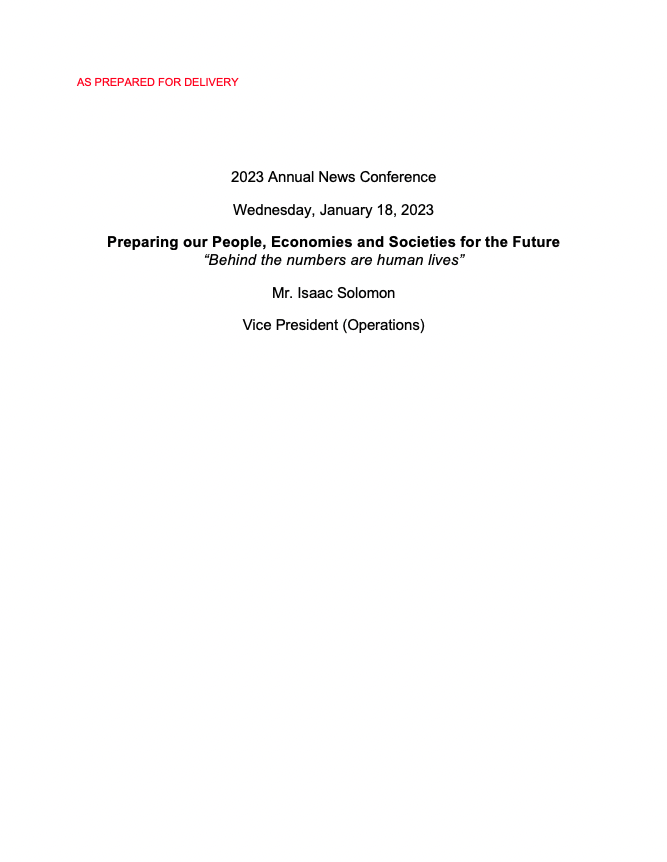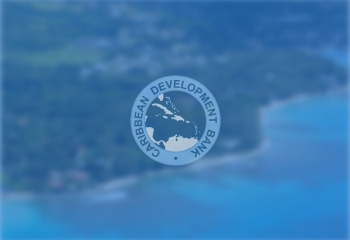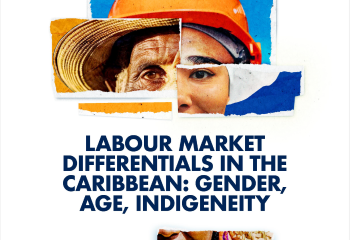2023 Annual News Conference - Mr. Isaac Solomon

Good morning Ladies and Gentlemen. I will provide an overview of the region’s economic performance in 2022, along with some forecasts and highlights for 2023. In addition, I will report on the performance of CDB’s projects in 2022.
We are united with our stakeholders in improving the environment and reducing poverty in the region. At the forefront of this imperative are our diverse constituents, some of whom are acutely affected by challenges limiting their potential. Focusing on our collective strengths, we continue to provide support to adequately prepare our societies for the future. In 2022 some pathways to this future were built through more than 65 CDB projects across our Borrowing Member Countries (or BMCs), contingent policy advice, and also technical leadership in our interface with thousands in the field despite the lingering presence of COVID-19.
Notwithstanding, the Caribbean is now at a critical juncture. The impact of protracted shocks has compounded the Region’s socio-economic challenges. Many have been pushed into poverty and many long-held development gains have been eroded. In 2022, CDB provided much needed assistance amid strained fiscal budgets, and remained responsive to our BMCs’ demands for resources to strengthen and reposition economies for longer-term inclusive growth.
Economic Review 2022/Economic Projections 2023 – The Implications of A Post-Pandemic Economic Recovery Tempered by Global Uncertainty
Early optimism for a strengthening of the global economic rebound which began in 2021, and an easing of COVID-19 legacy supply-chain imbalances, was dampened by the Russia – Ukraine war. Despite the emerging challenges, BMC economies continued to recover. Increased economic activity spurred strong regional economic growth that averaged 10.3% in 2022 compared to 4.5% in 2021.
Regional growth was largely underpinned by increased energy production in Guyana and Trinidad and Tobago and higher international oil prices, fuelling much of the 20.6% economic growth in commodity-exporting BMCs.
In tourism-dependent countries, increases in extra-regional airlift resulted in a strong, though incomplete, recovery amid rising inflation that dampened domestic demand and moderated growth in key economic sectors. This outturn helped buoy economic growth of 4.6% with increased Government revenues and improved fiscal positions.
The average primary surplus also improved slightly from a deficit of -1.1% of GDP in 2021 to a surplus of 0.2%. The Region’s pace of debt accumulation slowed in 2022. This, and higher nominal GDP placed debt ratios on a downward trajectory.
Supply-chain imbalances, high and persistent food and energy inflation and rising cost-of-living coupled with heightened concerns over food and energy security are at the forefront of development challenges. As the President stated, access to food remains a major concern. Food insecurity threatens our Region, especially the poor for whom food and fuel comprises a large share of their consumption basket. Governments cushioned this impact, pivoting from significant pandemic-related fiscal stimuli and income support towards cost-of-living assistance. We welcome and support the initiative of the Heads of Government of CARICOM to reduce the estimated USD5 billion regional food import bill by 25% by 2025. We also continue to invest in climate resilient agriculture production and marketing systems in several BMCs. CDB is financing consultancy services to help devise urgent provisional measures to re-establish regular air transport services within the OECS, and inform the establishment of a Marine Cargo Service between Guyana, Trinidad and Tobago, Grenada and Barbados.
To reduce inflation, monetary authorities across all major economies, concurrently rolled back accommodative monetary policy aimed at supporting the post-pandemic recovery. Similar disinflation policies were also deployed by Central Banks and Monetary Authorities in some BMCs as they grappled with the difficult policy trade-off of lowering inflation versus slowing the recovery.
Now 2022 was an extremely difficult year for the Haitian people, who continue to endure political instability and attendant insecurity. Of particular concern was gang-related violence, acute food and fuel shortages, price hikes and continued negative impacts of natural hazard events and climate change. CDB stayed close to the situation and continues its efforts to meet Haiti’s development needs. In addition to policy advice, our portfolio of interventions – focused on education, climate resilient agriculture, disaster risk management and climate resilience – is ongoing through the Haiti Country Office.
Turning to labour market conditions, women’s employment was especially affected during the Pandemic. There were general improvements in 2022. Data, where available, shows increased employment levels for men and women, mirroring the lifting of COVID-19 restrictions and the reopening of key economic sectors. Unemployment among the Region’s youth is expected to remain elevated, underscoring that we must invest collectively in addressing this challenge. At the Bank, we expanded support to improve the business climate among our BMCs with a focus on the procedures to start a business. The intent is to enhance these processes and increase access to the formal economy for underserved groups such as women, youth and persons with disabilities.
The Region was largely spared the brunt of catastrophic storm impacts during in 2022 but there is a great need for resources if we are to meet our climate commitments under the Paris Agreement and make progress on the implementation of the 2030 Agenda for Sustainable Development. The Bank successfully met its declared objective to be fully aligned with the Agreement by December 2022. Alignment is important to contribute to reducing global greenhouse gases, promoting adaptation and advocating for more climate finance resources as we play our part in addressing the global climate crisis. As we pursue economic recovery and strengthen resilience, if we do not make the right investments now, climate change impacts and the associated costs will mount.
Economic Outlook
Looking ahead, for 2023 we project that, despite facing multiple challenges, BMCs’ economic performance will continue to improve over the medium-term. While cautiously optimistic about the near-term outlook and recognising the uncertainty regarding the war in Ukraine, it is difficult to estimate growth with a large degree of certainty.
CDB forecasts regional growth of 5.7 % in 2023, anchored on the continued resuscitation of tourism arrivals and continued investments in the energy sector. This forecast, however, is subject to some downside risks since most Advanced Economies are on track to register lower growth relative to 2022, increasing the likelihood of a global recession. When coupled with continued, albeit lower inflation, this slowdown in economic activity could trigger stagflation.
The predicted economic growth should boost government revenues and aid in improving fiscal outturns. In addition, some BMCs have signaled intentions to intensify consolidation efforts in 2023 to get back in line with fiscal rules suspended during the pandemic period.
Focus now needs to be on targeted social support to those most vulnerable to the cost-of-living crisis. However, a slower-than-expected economic recovery could delay implementation of economic and fiscal reforms and progress in fiscal consolidation.
In 2023, the effects of tighter monetary policy in advanced economies in response to stubbornly high inflation will be felt within the region through higher interest rates on sovereign instruments, downward pressures on possibly both foreign direct investment and inward remittance flows. The second-round effects of such policies can adversely affect the Region’s ability to access adequate concessional development financing, and to sustain progress towards attaining the Sustainable Development Goals. The ever-present risk associated with natural hazard events will continue to loom over the Region.
I’ve painted a picture of the 2022 landscape and what lies ahead – I will now share more on some key aspects of CDB’s response, and where we think our full attention as a region is needed.
Project Performance – The Impact of and our Response to a Tempered Economic Recovery
As we continued to help BMCs meet the SDGs, working closely with communities, countries and development partners, CDB was able to make a number of development achievements that moved us closer to the SDGs. In 2022, approved Grant and Loans totalled 158.1 mn United States Dollars 15% over the previous year. Disbursements totalled 292.5 mn United States Dollars. We also made strides in key projects in Suriname, Guyana, Bahamas, St Vincent and the Grenadines and Belize.
Beyond 2021, we were able to play a major catalytic role in increasing trade and related economic opportunities through the EPA and CSME Standby Facility for Capacity Building. In addition, we continued to strengthen social sector infrastructure in communities through the Basic Needs Trust Fund, BNTF, programme.
Accelerating the recovery from COVID-19:
CDB remains at the forefront of the regional effort to accelerate recovery from the COVID-19 pandemic. We have supported programmes for health, social resilience and learning continuity in the OECS. As of December 31, 2022, CDB approved 9 projects and disbursed 25 million United States dollars under the 50mn Global Loan Programme. CDB, in partnership with the CARICOM Secretariat and OECS Commission, developed the Let’s REAP Programme to provide schools in BMCs with a roadmap to address the pandemic related learning gaps and increase inclusion.
The Bank approved 570,000 United States dollars to provide certification training for 3,000 teachers. An additional 12,000 teachers are to be certified and approximately 1.2 million boys and girls stand to benefit from this investment. We also advanced special education training for 75 teachers in St. Lucia, to help cater more effectively to varied student needs and improve the quality of education.
New Partnerships have also been forged with CDB signing a financing agreement for a soft loan of 50 million USD with the Government of the Italian Republic for a Programme to Support Sustainable Development Projects in the Caribbean Community Countries. Interventions are also underway to increase climate resilience, trade and agriculture. Of note are the 14 million Euros from the European Union to implement the Caribbean Action for Resilience Enhancement, CARE, Programme and 9.86 million United States dollars from the Adaptation Fund to implement the “Building Resilience for Adaptation to Climate Change and Climate Variability in Agriculture in Saint Lucia Project.”
In concluding, CDB and its BMCs take a holistic view of resilience building and development. Hence, our development activities are designed to be responsive to pressing socio-economic and environmental issues to create and seize opportunities for increased resilience and sustainable development, and to drive success in vital areas in 2023 and beyond.
BMCs must consider redoubling efforts to address the structural drivers of vulnerability, crime, and poverty, to build the necessary resilience to enhance economic growth prospects and grow sustainably. We strongly believe that, in addition to pursuing the previously mentioned priorities, the following must be key drivers towards the achievement of more holistic development that is gender-responsive and has lasting solutions and impacts:
- For financial resilience, we commit to supporting comprehensive debt management strategies, public financial management, and promoting access to adequate and affordable financing
- For social resilience, promoting gender equality, women’s reintegration into the work force and the prevention of discrimination, sexual and gender-based violence; and in addition, strengthening social protection systems (such as unemployment insurance)
- For building production resilience, promoting a private sector ecosystem that has innovation, diversification, financial inclusion of the most vulnerable, and MSME development as a way of reducing poverty at its core; this also includes enhancing economic infrastructure such as investing in significant water projects
- For greater institutional resilience, key priority actions in strengthening governance capacity to deliver through implementation of cross-sectoral policies and programmes, and to avert and manage crisis, protecting the poorest in societies
- Revolutionising digital infrastructure and technical proficiency at all stages of life, promoting good governance, improving evidence-based decision-making, and mainstreaming the building of environmental sustainability/climate change as cross-cutting areas
This is an ambitious undertaking which must be appropriately resourced and financed comprehensively and expeditiously. Governments must move with haste. The Bank is a willing partner seeking new avenues and partnerships to fund the region’s growth and development. While more capital is required, much more work also lies ahead. The Bank continues its pursuits zealously recognising that we have and will always consider the impact of our inputs on the lives of those evident behind the numbers.
I hand over to my colleague, Miss Ann-Marie Warner, Deputy Director of Corporate Strategic Division, who will present the Development Review and Forecast.




